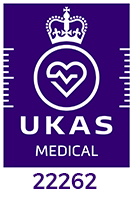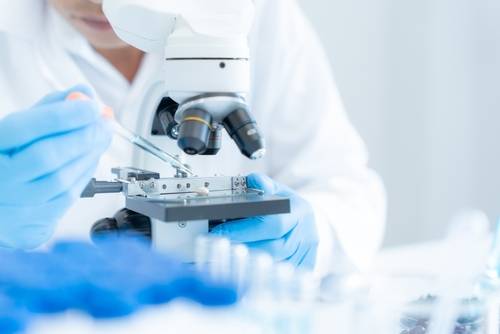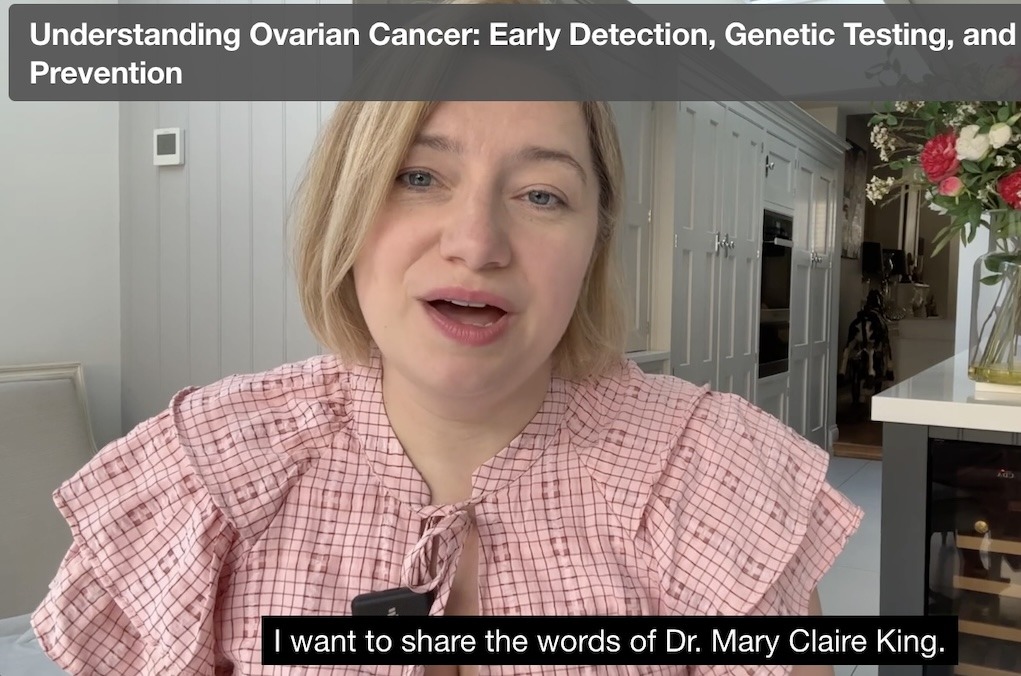As Featured In
As Featured In
Types of Inherited Cancer We Test For
Our test looks for over 30 gene mutations linked to inherited cancers. These include:
🧬 Genes We Test
-
MLH1, MSH2, MSH6, PMS2 (Lynch syndrome)
-
APC (Familial Adenomatous Polyposis)
-
MUTYH, RNF43 and GREM1
Gene mutations cause about 35% of early-onset colorectal cancer, when people get cancer under 50 years of age.
📈 Risk Increase
-
Lynch syndrome: Bowel cancer risk ranges from 12% to 75% before 75 years of age.
-
Familial adenomatous polyposis (FAP): This is caused by a mutation in an APC gene. Polyps start in childhood, up to 90% of people will develop cancer by 45 years of age without treatment. Some types of APC gene mutation cause a milder form of FAP, these people have fewer polyps and develop cancer at older ages, on average 54 years.
-
MUTYH-associated polyposis (MAP): Caused by mutations in the MUTYH gene. Usually, people are only affected if they inherit TWO faulty copies of the MUTYH gene. Occasionally some people have a combination of mutations in MUTYH and APC genes. The risk of bowel cancer in patients with two MUTYH gene mutations has been estimated at between 43% to 100%. People with only one faulty copy may also be at slightly increased risk.
-
RNF43 and GREM1: both associated with polyposis and increased cancer risk.
- Other less common gene mutations include POLE and POLD1, MSH3, and NTHL.
🛡️ If You Test Positive
- Early Detection
- Colonoscopy: For example for MLH1 mutation carriers bowel cancer screening by a colonoscopy is recommended every 2 years from 25 years of age. This will help to detect cancers earlier, when treatment is easier and more successful.
- Prevention
- Aspirin: Taking a simple aspirin tablet daily for 2 years reduced the risk of bowel cancer by 60%. That’s an enormous benefit for a simple medicine and a great example of why it is so important we find more people with these mutations so they get to actually prevent their cancers.
- Fibre: a high-fibre diet can also reduce the risk of other cancers associated with Lynch Syndrome such as stomach and endometrium (womb).
- Other Cancers: you can discuss options for reducing risk of other cancers. For instance, many women with Lynch Syndrome choose to have a hysterectomy (removal of the womb) to reduce the risk of endometrial (womb) cancer, after completing their family in their mid to late 40’s.
🧬 Genes We Test
-
BRCA1 and BRCA2
-
PALB2, TP53, CHEK2, ATM
- CDH1, PTEN, STK11
About 5-10% of breast cancers are directly caused by an inherited genetic mutation. This means the person has inherited a ‘fault’ in a gene. linked to breast cancer risk from either their biological mother or father.
📈 Risk Increase
- BRCA1 & BRCA2 – High risk: these cause a high risk of breast cancer, for example people with a BRCA1 mutation may have up to 90% lifetime risk of breast cancer.
- PALB2, TP53, CHEK2, ATM – Moderate risk: mutations in these genes carry a 15-60% lifetime risk of breast cancer. The exact estimate will depend on the mutation, as well as other lifestyle factors.
- CDH1, PTEN, STK11 – These are much rarer gene mutations which are associated with breast cancer risk.
🛡️ If You Test Positive
-
Annual breast MRI from an earlier age, usually from 30 years of age for females.
- Breast MRI and mammogram screening can identify cancers at an early stage, when treatment is easier and more successful.
- We can also ensure breast density is assessed regularly, and consider a Multi-Cancer Early Detection Blood test from 35 years of age.
-
Risk-reducing medication
- Medication can reduce the risk of cancer developing by up to 50%
-
Consideration of preventative surgery (mastectomy)
- Risk-reducing mastectomy and reconstruction can reduce breast cancer risk by over 95%.
-
Protecting Other Family Members
- It can be a great gift to safeguard the health of your family members by sharing your results. Giving them the power to prevent cancer and detect it earlier. Many of the genes are also linked to other cancers, which we can do additional screening and prevention for, including:
- Ovarian Cancer
- Pancreatic Cancer
- Melanoma
- It can be a great gift to safeguard the health of your family members by sharing your results. Giving them the power to prevent cancer and detect it earlier. Many of the genes are also linked to other cancers, which we can do additional screening and prevention for, including:
Mutations in Men and Other Cancers
Half of the people with a BRCA1 or BRCA2 mutation, will be biological males. Many men don’t worry about a family history of breast cancer but this is a mistake.
- Breast Cancer: Men with a BRCA1 or BRCA2 mutation have an increased risk of male breast cancer
- It Is important they regularly check their chest and report any changes or lumps.
- Male breast cancer is generally rare, affecting less than 0.02% of men, if they have a BRCA1 or 2 mutation that jumps to 7-9%.
- It is strongly recommended that any male who has breast cancer themselves have genetic testing.
- Prostate Cancer: They have an up to 60% chance of getting prostate cancer in their lifetime. That’s over 8 times the average male.
- Regular screening such as PSA tests can help them detect this earlier.
- We also have newer screening options available at Coyne Medical, including the Stockholm3 test.
- Pancreatic Cancer: The risk of this cancer particularly affects men over 50 years.
- Men with a BRCA1 or BRCA2 mutation have over 7 times the risk of an average male.
- Melanoma skin cancer
- Regular skin checks and preventative measures are important.
🧬 Genes We Test
-
BRCA1 and BRCA2
-
PALB2, HOXB13, ATM, CHEK2
- EPCAM, MLH1, MSH2, MSH6
Prostate cancer has a strong genetic component. For example, we know if a man has a brother with prostate cancer they have a 30% chance of developing prostate cancer before 75 years of age. Testing for inherited cancer risk is especially important if there is a family history of prostate cancer before 60 years of age or metastatic prostate cancer.
📈 Risk Increase
-
BRCA2: BRCA2 mutation carriers have up to 8 times higher risk compared to non-carriers. The risk in BRCA1 mutation carriers is lower.
-
HOXB13: increased risk especially with family history, may cause a 3 to 4 times higher chance of prostate cancer.
-
ATM and CHEK2: carriers of these mutations have approximately 2 to 3 times the risk of prostate cancer.
-
Lynch syndrome (EPCAM, MLH1, MSH2, MSH6): Have about 2 times the risk of a non-carrier, but those with a MSH2 mutation may be at higher risk, approximately 23% chance before 75 years of age.
- PALB2: The risk of prostate cancer is not clear, but regular checks are sensible as some men may be at risk, especially if there is a family history.
🛡️ If You Test Positive
-
Earlier and more frequent PSA testing (prostate cancer blood test)
- We can also use newer tests such as Stockholm3 and Multi-Cancer Early Detection Blood tests.
-
MRI prostate screening
- Especially valuable for increases in PSA and more accurate diagnosis.
-
Personalised decisions around biopsy and treatment
-
Protecting Family Members
- Relatives can benefit from extra and earlier prostate cancer screening. Many of the genes involved are also linked to other cancers, so we can offer extra screening and early detection for these too.
- Breast Cancer
- Ovarian Cancer
- Colon Cancer
- Pancreatic Cancer
- Relatives can benefit from extra and earlier prostate cancer screening. Many of the genes involved are also linked to other cancers, so we can offer extra screening and early detection for these too.
🧬 Genes We Test For
-
BRCA1, BRCA2, PALB2
-
RAD51C, RAD51D, BRIP1
- Lynch Syndrome (MLH1, MSH2, MSH6, PMS2 genes)
📈 Risk Increase
-
BRCA1 carriers have approximately a 40% risk.
-
BRCA2 carriers have approximately a 15% risk.
-
Lynch Syndrome (MLH1, MSH2, MSH6, PMS2 genes): the ovarian cancer risk may be up to 13%, in MSH2 carriers.
- PALB2: the risk is estimated at around 5%.
-
BRIP1: the lifetime risk is about 5.8%.
- RAD51C and RAD51D the risk is 5.2% and 12% respectively over the person’s lifetime.
🛡️ If You Test Positive
-
Consider preventative surgery after childbearing (salpingo-oophorectomy)
- Removal of the tubes and ovaries, usually done as a laparoscopic (keyhole) surgery can significantly reduce the risk of cancer
-
Personalised screening
- Knowing the increased risk makes the use the of latest tests including Ca-125 blood test, and the Multi-Cancer Early Detection Blood test.
- Symptom Awareness
- Ovarian cancer symptoms are often confused for other conditions, such as digestion issues or bladder problems. Knowing you are at increased risk means we can act early on any symptoms.
-
Hormonal and lifestyle support post-surgery
- We can personalise your management after risk-reducing surgery, including using Hormone Replacement Therapy.
-
Protect Family Members
- Give the power of prevention and early detection to your loved ones. Many of the genes linked to ovarian cancer are also linked to other cancers which can be preventable and detected earlier with the right screening, including:
- Breast Cancer
- Prostate Cancer
- Pancreatic Cancer
- Bowel Cancer
- Endometrial (womb) Cancer
- Give the power of prevention and early detection to your loved ones. Many of the genes linked to ovarian cancer are also linked to other cancers which can be preventable and detected earlier with the right screening, including:
🧬 Genes We Test
-
CDKN2A (most common)
-
BAP1 (associated with multiple cancers)
-
CDK4, PTEN, BRCA2
- MITF (looking for the E318K variant)
Melanoma risk is largely inherited as we inherit our skin colour from our biological parents, and we know light-skinned people have 2 times the risk of dark-skinned people. But some families do carry a harmful genetic variant which passes on a high risk of melanoma, it is especially worth screening when people have had multiple melanomas, or been diagnosed under 40 years of age.
📈 Risk Increase
-
CDKN2A: 30–70% lifetime risk depending on family history and sun exposure
-
BAP1: linked to melanoma of the skin and eye
-
CDK4: may have a lifetime risk of up to 80% for melanoma
- MITF (E318K variant): 2 – 4 times risk of cutaneous melanoma.
🛡️ If You Test Positive
-
Full skin checks annually
- We know early detection of melanoma is very important to make treatment easier and more successful.
-
Personalised advice on UV protection and mole surveillance
- Monthly self-checks are sensible alongside your regular visits. Plus careful UV protection can significantly reduce your risk of melanoma.
-
Early biopsy of suspicious lesions
- Knowledge of your risk means you can get new lesions checked promptly.
-
Protecting Family Members
- Knowledge of a gene mutation in a family means you can give your loved the power to prevent cancer and detect it earlier. Many of the genes linked to melanoma are also linked to other cancers, which we can do additional screening and early detection for, including:
- Pancreatic Cancer
- Breast Cancer
- Ovarian Cancer
- Knowledge of a gene mutation in a family means you can give your loved the power to prevent cancer and detect it earlier. Many of the genes linked to melanoma are also linked to other cancers, which we can do additional screening and early detection for, including:
Pricing at a Glance
✅ £650 – At-home testing (35 cancer genes, incl. BRCA1 & BRCA2)
All options include consultations with a Coyne Medical doctor, sample collection or delivery, full lab analysis, and personalised follow-up care.
How Our At-Home Genetic Testing Works
Step 1: Video Consultation with a Doctor
30-minute consultation with a doctor to check it is the right test for you.
Step 2: Sample Kit Delivered
Next-day delivery, ready to use.
Step 3: Send Your Sample Back
Prepaid return, no hassle.
Step 4: Get Your Results
Receive expert guidance in 15-20 days.
Why We Are Passionate About Helping You Use The Power Of Genetic Screening
At Coyne Medical, this is why Dr Lucy and our team are deeply committed to raising awareness and improving access to genetic screening. We believe that identifying inherited cancer risk shouldn’t be rare—it should be routine. Because when people know their risk, they can protect their future and their families.
“Testing helped me reduce my risk of breast cancer by over 95%.” – Dr Lucy Hooper
Why Choose Coyne Medical for Genetic Screening?
Most services stop at results. We go further—personalised, doctor-led, and with you at every step.
❌ What Others Provide
- Lab-only results
- One-size-fits-all tests
- No expert guidance
✅ What We Provide
- Doctor-led care from start to finish
- Genetic tests tailored to you
- Free follow-up to act on your results
💰 Price: £650 – Includes Video Consultation + Test + Free Follow-Up
Frequently Asked Questions
Genes are small sections of DNA that provide the instructions that give us our individual characteristics. Our genes determine the colour of our eyes and hair, our height and other physical characteristics. Genetic testing looks at variations in these genes that determine whether you might be predisposed to certain diseases. Genetic testing can also tell us how your body might respond to drugs.
The Association of British insurers and the British Medical Association have agreed on a set of questions that insurers can ask your GP when you apply for life insurance. Your GP will be asked about any medical condition that you have suffered in the past or are currently experiencing that may reduce your life expectancy. They are also allowed to ask you and your GP about your family history. They are not allowed to ask or request the results of any predictive genetic testing.
Currently, the only exception in the UK to this is if you are applying for insurance with the only exception being if you are applying for life insurance over £500,000 and you have had a predictive genetic test for Huntington’s Disease. Only in this circumstance do you need to tell the insurance company the result of the test, if they ask.
If you have a strong family history of breast cancer for example and you test negative for genes related to this it may be in your interest to disclose this and you may choose to do this. You can read more about the code of the Association of British Insurers here.
There are two possible outcomes from our cancer gene testing: Negative and positive.
If the result is negative it means that the test did not pick up any genes that increase the risk of disease. It doesn’t mean that you will never develop one of the conditions tested for, as there are many other factors aside from genes that can contribute to developing a disease. As we learn more about genetics and disease, it may be that your test results in the future will be updated to reflect new medical information. If this is the case, we will inform you immediately.
A positive result means you have discovered a gene variant that increases the risk of you developing a certain cancer. You will then be able to work with your doctor to determine what the next steps are for you. This may include options to prevent disease or increased surveillance to detect the disease at an earlier, more treatable stage.
We ensure the highest level of security for your personal information. We will never sell or share your medical information or data. Full details of our privacy policy are available here. We use our patient portal to securely share copies of your results by email. We can use an alternative method of communication if you wish – just let us know.
The genetic testing laboratory receive your personal information and abide by the extremely strict rules on privacy of sensitive data. You must consent to their receiving and sharing your personal information and data. You may choose to opt-out of anonymised research studies.
We only use medical-grade genetic testing. We use a leading specialist laboratories, who are fully accredited to ISO 15189 and 17025.
Our genetic testing uses both full-gene sequencing and deletion/duplication analysis using next-generation sequencing technology (NGS). This is the most accurate method. Some online DNA testing and family history companies use other methods such ‘genotyping’; this leads to more common false positive and negative results. They can be fun and quick to use but are not meant to guide medical decisions or healthcare.
We offer two levels of genetic cancer screening, with options for at-home or in-clinic testing:
🔹 35 Cancer Gene Panel
-
£650 – At-Home Testing
-
£900 – In-Clinic Testing
Includes: -
Pre-test video consultation with a doctor
-
Medical and family history review
-
Sample collection (saliva)
-
Laboratory analysis of 35 cancer risk genes (including BRCA1/2, TP53, PALB2, etc.)
-
Follow-up consultation with a doctor to explain your results
-
Full written report with personalised recommendations for screening, prevention, or onward referral
🔹 54 Cancer Gene Panel + Pharmacogenomics
-
£1300 – In-Clinic Only
Includes everything in the standard panel, plus: -
Expanded analysis of 51 cancer risk genes
-
Pharmacogenetic testing: insight into how your genes may affect medication response (including dosage, side effects, and alternatives)
-
Integrated results report with recommendations for both cancer screening and medication management
✅ All options include follow-up with a Coyne Medical doctor, personalised next steps, and letters for your NHS GP or specialist referrals if needed.
Tumour genes include those related to:
Breast cancer
Ovarian cancer
Uterine cancer
Colorectal cancer
Cutaneous melanoma (skin cancer)
Gastric cancer
Pancreatic cancer
Prostate cancer
Renal cell cancer
Thyroid cancer
Full List of Genes Tested
APC, ATM, BAP1, BARD1, BMPR1A, BRCA1, BRCA2, BRIP1, CDH1, CDK4, CDKN2A, CHEK2, EPCAM, GREM1, HOXB13, MITF, MLH1, MSH2, MSH6, MUTYH, NF1, NTHL1, PALB2, PMS2, POLD1, POLE, POT1, PTEN, RAD51C, RAD51D, RNF43, SMAD4, STK11, TP53, VHL
Yes we believe genetic screening is a really powerful addition to our health screening. Check out our packages here.
Take Control Of Your Health
Start your personalised journey to cancer prevention with expert support.
Unsure Which Test is Right for You?
Speak with one of our experienced doctors in a 30-minute discovery call.
💳 £250 – fully refundable if you proceed with any screening.
Interested in BRCA Testing? Compare Care, Support and What’s Included
| Feature | Check4Cancer | Coyne Medical | Randox |
|---|---|---|---|
| Price | £945 | £650 | £529 |
| Sample Type | Saliva (home kit) | Saliva (home kit) | Saliva (home kit) |
| Genes Tested | 11 genes incl. BRCA1/2 | ✅ 30+ genes incl. BRCA1/2, TP53, ATM, PALB2, CHEK2 | 8 genes incl. BRCA1/2 |
| Pre-Test Process | Phone consent | ✅ 30-minute video consult with GP | ❌ None |
| Post-Test Consultation | Genetic counsellor | ✅ Same-day video call with experienced GP | Contact within 30 days to arrange results consultation |
| Follow-Up & Care Plan | Genetic counselling only | ✅ Full plan + GP/relative letters + private/NHS referrals | ❌ Limited – no full care planning |
| Written Report | ✅ Yes | ✅ Yes, with recommendations even if negative | ✅ Yes |
| Time to Results | 3–4 weeks | ✅ 15–20 working days | 6 weeks |
| Lab Accreditation | ✅ CQC & UKAS | ✅ UKAS-accredited lab | ✅ CQC (UKAS not confirmed) |
| Can Be Bundled with Screening? | ❌ No | ✅ Yes – discounted with health screen | ❌ No |
Interested in BRCA Testing? Compare Care, Support and What’s Included
Sample Type: Saliva (home kit)
Genes Tested: 11 incl. BRCA1, BRCA2, PALB2, ATM, CHEK2, TP53, etc.
Pre-Test: Phone consent
Post-Test: Genetic counsellor
Follow-Up: Counselling only
Written Report: ✅ Yes
Time to Results: 3–4 weeks
Accreditation: ✅ CQC & UKAS
Bundled Screening: ❌ No
Sample Type: Saliva (home kit)
Genes Tested: 30+ incl. BRCA1, BRCA2, TP53, PALB2, ATM, CHEK2, etc.
Pre-Test: ✅ 30-minute video consult with GP
Post-Test: ✅ Same-day video call with experienced GP
Follow-Up: ✅ Full care plan + letters + referrals + scans
Written Report: ✅ Yes, with recommendations
Time to Results: ✅ 15–20 working days
Accreditation: ✅ UKAS lab
Bundled Screening: ✅ Yes – discounted option
Sample Type: Saliva (home kit)
Genes Tested: 8 incl. BRCA1, BRCA2, ATM, PALB2, TP53, etc.
Pre-Test: ❌ None
Post-Test: Contact within 30 days to arrange results consultation
Follow-Up: ❌ Limited – no full care planning
Written Report: ✅ Yes
Time to Results: 6 weeks
Accreditation: ✅ CQC (UKAS not confirmed)
Bundled Screening: ❌ No
We're Here To Help
If you can’t find the appointment you need or need other assistance please get in touch with us and we would be happy to help.
Email us at contact@coynemedical.com or call us on 02077313077.







